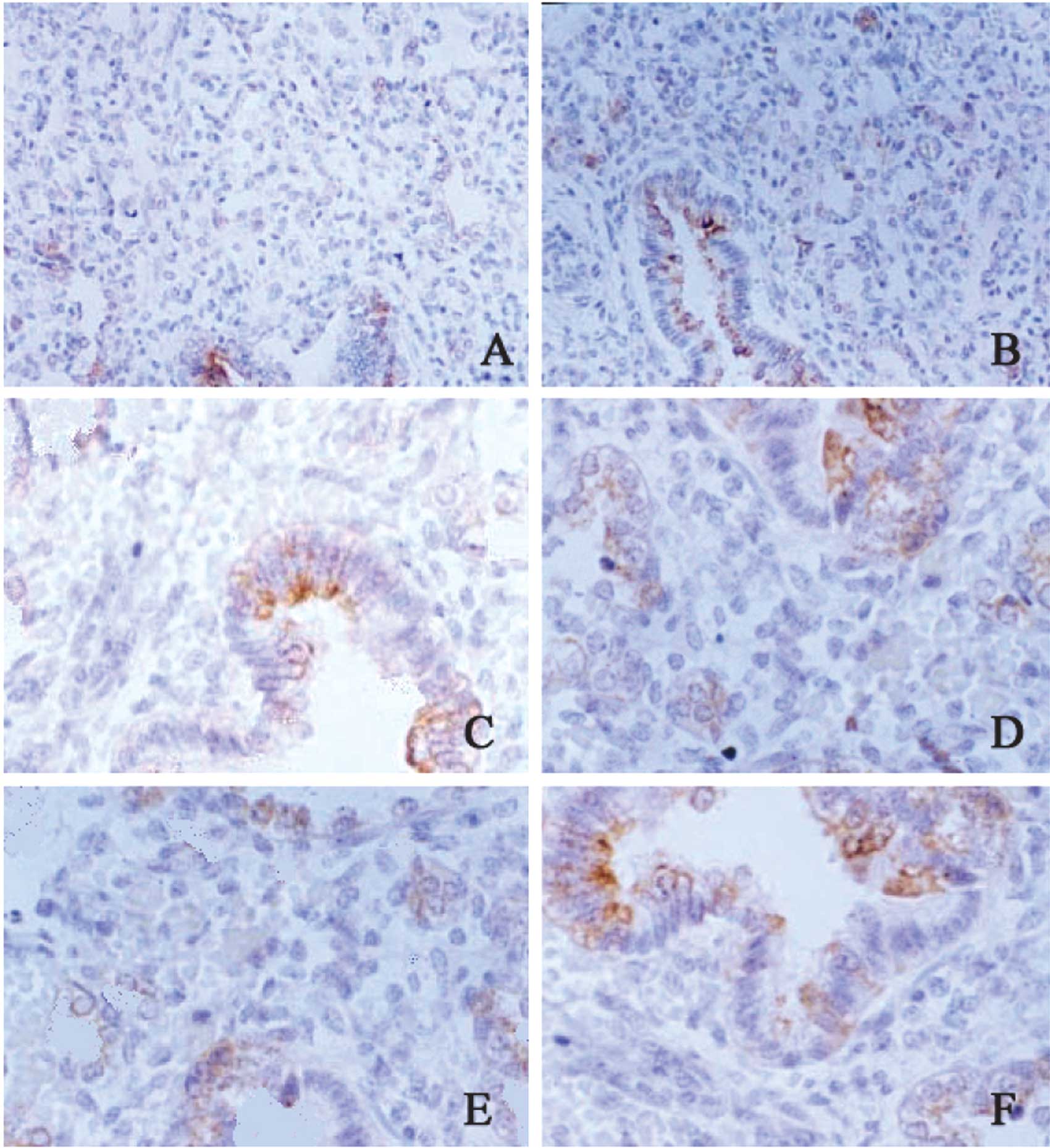|
1
|
Nkadi PO, Merritt TA and Pillers DA: An
overview of pulmonary surfactant in the neonate: genetics,
metabolism, and the role of surfactant in health and disease. Mol
Genet Metab. 97:95–101. 2009. View Article : Google Scholar : PubMed/NCBI
|
|
2
|
Mazela J, Merritt TA, Gadzinowski J and
Sinha S: Evolution of pulmonary surfactants for the treatment of
neonatal respiratory distress syndrome and paediatric lung
diseases. Acta Paediatr. 95:1036–1048. 2006. View Article : Google Scholar : PubMed/NCBI
|
|
3
|
Chen MG, Atkins CL, Bruce SR, Khan AM, Liu
Y and Alcorn JL: Infant formula alters surfactant protein A (SP-A)
and SP-B expression in pulmonary epithelial cells. Pediatr
Pulmonol. 46:903–912. 2011. View Article : Google Scholar : PubMed/NCBI
|
|
4
|
Yin XJ, Luo FP, Li AH, et al: Relationship
between reduced expression of surfactant protein B and neonatal
respiratory distress syndrome in twenty Han ethnic group neonates
in China. Chin J Pediatr. 46:9–12. 2008.
|
|
5
|
Lu WC, Xiang W, Wu M, et al: Relationship
between pulmonary surfactant-associated protein B polymorphisms and
the susceptibility to neonatal respiratory distress syndrome.
Zhongguo Dang Dai Er Ke Za Zhi. 14:24–27. 2012.(In Chinese).
|
|
6
|
Chroneos ZC, Sever-Chroneos Z and Shepherd
VL: Pulmonary surfactant: an immunological perspective. Cell
Physiol Biochem. 25:13–26. 2010. View Article : Google Scholar : PubMed/NCBI
|
|
7
|
Schürch D, Ospina OL, Cruz A and Pérez-Gil
J: Combined and independent action of proteins SP-B and SP-C in the
surface behavior and mechanical stability of pulmonary surfactant
films. Biophysical J. 99:3290–3299. 2010.PubMed/NCBI
|
|
8
|
Orgeig S, Hiemstra PS, Veldhuizen EJ, et
al: Recent advances in alveolar biology: evolution and function of
alveolar proteins. Respir Physiol Neurobiol. 173(Suppl): S43–S54.
2010. View Article : Google Scholar : PubMed/NCBI
|
|
9
|
Puthothu B, Forster J, Heinze J, Heinzmann
A and Krueger M: Surfactant protein B polymorphisms are associated
with severe respiratory syncytial virus infection, but not with
asthma. BMC Pulm Med. 7:6–8. 2007. View Article : Google Scholar : PubMed/NCBI
|
|
10
|
Tafel O, Latzin P, Paul K, Winter T,
Woischnik M and Griese M: Surfactant proteins SP-B and SP-C and
their precursors in bronchoalveolar lavages from children with
acute and chronic inflammatory airway disease. BMC Pulm Med.
8:62008. View Article : Google Scholar : PubMed/NCBI
|
|
11
|
Teja K, Cooper PH, Squires JE and
Schnatterly PT: Pulmonary alveolar proteinosis in four siblings. N
Engl J Med. 305:1390–1392. 1981. View Article : Google Scholar : PubMed/NCBI
|
|
12
|
Hamvas A, Nogee LM, Wegner DJ, et al:
Inherited surfactant deficiency cause by uniparental disomy of rare
mutations in the surfactant protein-B and ATP binding cassette,
subfamily a, member 3 genes. J Pediatr. 155:854–859. 2009.
View Article : Google Scholar
|
|
13
|
Sumita Y, Sugiura T, Kawaguchi Y, et al:
Genetic polymorphisms in the surfactant proteins in systemic
sclerosis in Japanese: T/T genotype at 1580 C/T (Thr131IIe) in the
SP-B gene reduces the risk of interstitial lung disease.
Rheumatology. 47:289–291. 2008. View Article : Google Scholar
|
|
14
|
Woodworth BA, Wood R, Bhargave G, Cohen
NA, Baatz JE and Schlosser RJ: Surfactant protein B detection and
gene expression in chronic rhinosinusitis. Laryngoscope.
117:1296–1301. 2007. View Article : Google Scholar : PubMed/NCBI
|
|
15
|
Lyra PP, Vaz FA, Moreira PE, Hoffmann JW,
Demello DE and Diniz EM: Comparison of surfactant protein B
polymorphisms of healthy term newborns with preterm newborns having
respiratory distress syndrome. Braz J Med Biol Res. 40:779–786.
2007. View Article : Google Scholar : PubMed/NCBI
|
|
16
|
Yin XJ, Li LH, Wang Y, et al: A study on
expression of surfactant protein B in neonatal respiratory distress
syndrome. Chin J Neonatol. 26:336–339. 2011.
|
|
17
|
Lyra PP, Diniz EM, Abe-Sandes K, Angelo
AL, Machado TM and Cardeal M: Surfactant protein B gene
polymorphism in preterm babies with respiratory distress syndrome.
Braz J Med Biol Res. 44:66–72. 2011. View Article : Google Scholar : PubMed/NCBI
|
|
18
|
Bakvad-Hansen M, Nordestgaard BG and Dahl
M: Surfactant protein B polymorphisms, pulmonary function and COPD
in 10231 individuals. Eur Respir J. 37:791–799. 2011. View Article : Google Scholar : PubMed/NCBI
|
|
19
|
Yin XJ, Xie L, Chi JH, et al: SP-B
deficiency induced neonatal respiratory distress symdrome: a report
of 3 cases. Chin J Neonatol. 26:2682011.
|















